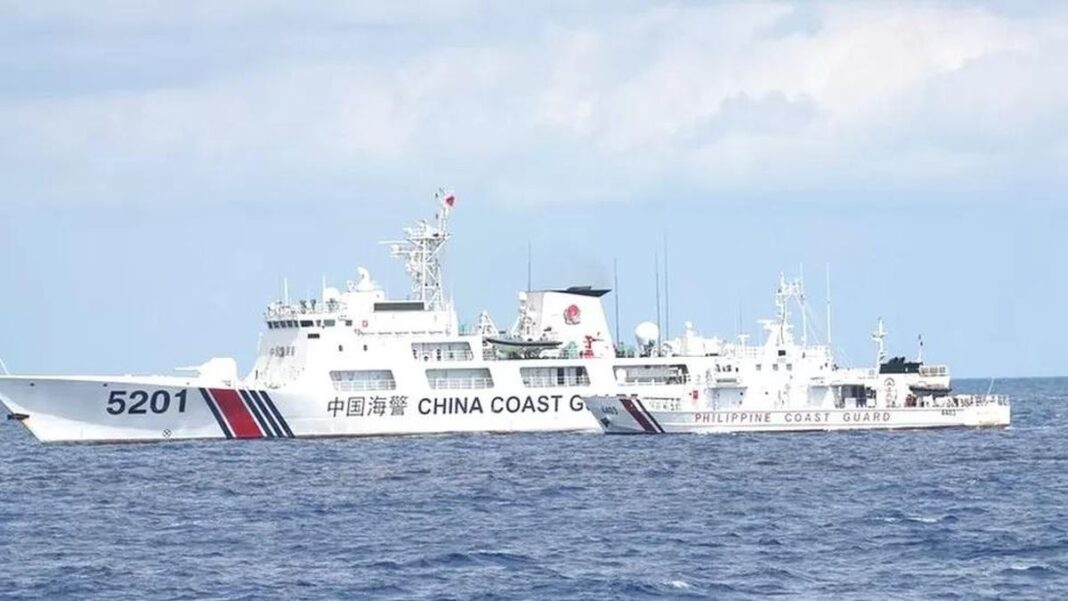The Philippines has accused China of seeking to bully smaller countries into submission and vowed it will continue its missions to deliver supplies to a grounded derelict warship that serves as an outpost in the South China Sea.
The Philippines deliberately grounded BRP Sierra Madre at Second Thomas Shoal, a submerged reef in the Spratly Islands, in 1999 to guard against expansion by China, and the ship has become a growing flashpoint in the fiercely disputed water.
Beijing has demanded the warship’s removal, and over recent months has repeatedly tried to block Philippine boats from delivering supplies to troops aboard – firing water cannon, targeting vessels with a military-grade laser and performing what Manila has condemned as dangerous manoeuvres. It claims almost the entire of the South China Sea, despite a tribunal finding this to have no legal basis.
“[China] wants to use its superior strength – in short, they want to bully small countries into submission. And it is very important for the international community to know that,” Colonel Medel Aguilar, a spokesperson for the Armed Forces of the Philippines, told the Guardian.
The Philippine president, Ferdinand Marcos Jr, had been clear that the BRP Sierra Madre would not be towed away, Aguilar said. “The BRP Sierra Madre will remain there, and will always be manned by our navy personnel. Therefore, you can expect that the rotation and resupply missions will also continue, in spite of the obstruction that China is doing.”
The majority of resupply missions had been completed, despite attempts by Chinese Coast Guard and Chinese maritime militia to interfere, he said. However, he said such incidents were endangering lives.
China has previously said that its coast guard has acted in a “professional and restrained” manner in blocking Philippine boats from reaching the Sierra Madre, and in accordance with the law.
On Monday, Chinese foreign ministry spokesperson Mao Ning told a press briefing that China “will neither take any inch of territory that is not ours, nor give up any inch of territory that belongs to us”, adding that “China is committed to settling relevant disputes through negotiation and consultation with relevant countries and will not waver in our determination to safeguard national sovereignty and territorial integrity.”
She said the US – which is a Philippine treaty ally, and has condemned the actions of Chinese vessels – should stop “interfering in the disputes between China and relevant countries … still less contain and encircle China by exploiting those issues.”
Analysts have warned that the ship, which is in a derelict state, could collapse imminently without significant repair work, leaving the shoal unoccupied. There are also concerns that, were recent maritime confrontations to escalate, this could bring the US into confrontation with China.
Resupply missions were aimed at ensuring the ship would “remain habitable” and provide a place a basic living space for personnel, Aguilar said. Repairs had been ongoing for years, he added, but did not specify the nature of such work or the types of supplies being delivered.
An international tribunal in The Hague in 2016 found that Second Thomas Shoal formed part of the exclusive economic zone and continental shelf of the Philippines. However, China has rejected the findings, and claims the vast majority of the South China Sea, where it has built and militarised various artificial islands.
Aguilar said the Philippines was not only protecting its national interests by maintaining its outpost at Second Thomas Shoal, but also that it was “promoting the United Nations Convention on the Law of the Sea – to make it stronger, to make it effective, such that it becomes an effective venue for settling maritime disputes without resorting to violence”.
Asked about the possibility of US ships escorting resupply missions, he said: “We are doing it on our own and it remains to be our own mission to accomplish.”
Aguilar added that the Philippines was pursuing a “transparency strategy” to ensure the international community was aware of China’s actions in the South China Sea, adding that this was building greater support.
Over the past year, the Philippines Coast Guard has frequently released video footage of the maritime confrontations, and invited journalists to watch its missions.
“They [China] want to hamstring us to follow, or to accept their terms – it is not in accordance with our law, or in accordance with international law … We may be a small country, but yes, we will assert our rights,” he said.”
The Philippines had already boosted its presence in the sea over the past year, was also developing its maritime capacities including by acquiring equipment and training with other countries, he said.
Aguilar said the Philippines maintained good relations with China in terms of trade and commerce, and that incidents in the South China Sea, did not define the countries’ relationship, but added: “We have to call out China to make sure that it also recognises the danger of what its people are doing.”
Source: The Guardian


